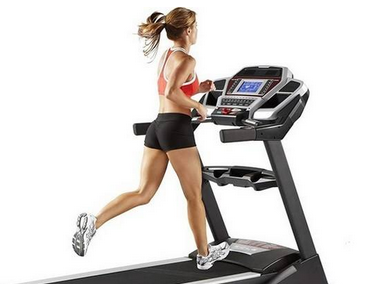Runners need to move 15 per cent faster on a treadmill to burn the same number of calories as jogging outdoors, research reveals.
一项研究表明,跑步者在跑步机上的速度要比户外慢跑快15%,才能与其燃烧同等热量。
Researchers from Milan University analysed the difference between running outdoors or on a treadmill in 15 physically fit males with an average age of 21.
意大利米兰大学的研究人员分析了平均年龄为21岁的15名健康男子去户外跑步与在跑步机上跑步的差异。
The participants sprinted for 30 seconds followed by 30 seconds of recovery for a total of 15 minutes both outdoors and on a treadmill.
参与者先快跑30秒,然后休息30秒,这样分别在户外和跑步机上运动15分钟。
Oxygen use and exercise intensity were measured after both types of running. The findings were published in the journal of Applied Physiology, Nutrition and Metabolism.
研究人员会在两种类型的跑步后,测量参与者的耗氧量和运动强度。研究成果发表在加拿大《应用生理学、营养与代谢》杂志上。

Results revealed that when on a treadmill, runners use significantly lower amounts of oxygen, suggesting less effort is required.
结果显示,在跑步机上跑步时,跑步者的耗氧量大大降低,表明这种方式更省劲。
The study authors wrote: 'A 15 per cent increase in running velocity during a high intermittent intensity treadmill training session is the optimal solution to reach the same physiological responses as an outdoor training session.'
该研究的作者写道:“在高间歇强度跑步机训练期间,跑步速度增加15%,是达到与户外锻炼同样生理反应的最佳解决方案。”
Although the study did not speculate why treadmill running appears to be less strenuous, previous research suggests the moving belt of a treadmill propels joggers forward, causing them to move faster.
尽管这项研究没有推测为何在跑步机上跑步似乎更省力,但以往的研究指出,跑步机上移动的跑带会推动跑步者向前,从而让他们跑得更快。
Exercising indoors also means gym-goers do not have to contend with steep hills or wind resistance.
此外,室内锻炼还意味着锻炼者不必应付陡峭的山坡或风的阻力。












